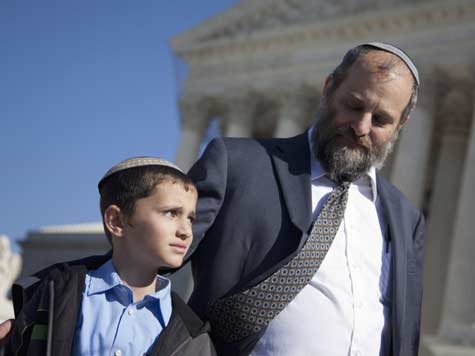
Federal courts will decide whether U.S. passports must declare Jerusalem part of Israel. In Zivotofsky v. Clinton, the U.S. Supreme Court overturned a lower court’s conclusion that this issue must be resolved in the political arena between President Obama and Congress.
American passports record “Place of Birth” as either “City, Nation” or “State, Nation.” (For example, mine reads, “Indiana, U.S.A.”) Because of the struggles involving Jerusalem in world politics, modern passports for Americans born in that city say only “Jerusalem” without identifying the nation in which Jerusalem is found. Then in 2002, Congress passed a law providing that Americans born in Israel can insist their passports list “Jerusalem, Israel.”
Menachem Binyamin Zivotofsky was born in Jerusalem to American parents shortly after this new law was signed by President George W. Bush. When his parents filed the application for “Jerusalem, Israel,” they were told the State Department would not comply. Bush issued a signing statement that his administration would not abide by this provision because it would “interfere with the President’s constitutional authority to formulate the position of the United States, speak for the Nation in international affairs, and determine the terms on which recognition is given to foreign states.”
Zivotofsky sued. The district court dismissed the case, and the U.S. Court of Appeals for the District of Columbia Circuit affirmed in 2006, holding that the political question doctrine requires this issue be fought out between the elected branches of government, not decided by the courts.
Zivotofsky argued to the Supreme Court that Congress has complete authority to decide what appears on a passport because it’s an immigration document, and the Constitution gives Congress sole power over immigration. President Barack Obama and Secretary Hillary Clinton argue that passports are diplomatic documents, and following this statute’s provision amounts to Obama taking the position that Jerusalem is part of Israel (which it is), not part of Jordan or any as-yet-nonexistent Palestinian state (which it’s not).
The Supreme Court held the D.C. Circuit wrongly dismissed this case under the political question doctrine in an 8−1 decision, with Chief Justice John Roberts writing the majority opinion for six justices. Roberts began, “In general, the Judiciary has a responsibility to decide cases brought before it, even those it would gladly avoid.”
There is a “narrow exception” for cases that fall within the political question doctrine. That exception is rooted in our earliest cases, including the 1803 case Marbury v. Madison. In 1962, the Supreme Court in Baker v. Carr identified six factors that could result in a federal court deciding that it lacks the ability to decide a political case.
Of these six, the two most common are that (1) the Constitution commits the issue to either Congress or the president, or (2) there are no legal standards that judges can apply in the case. That was the Court’s holding in the last major political-question case, Nixon v. United States in 1993. The D.C. Circuit looked to Baker and Nixon when it held that it couldn’t decide Zivotofsky’s case because doing so would interfere with the president’s foreign policy.
The Supreme Court rejected this opinion. Marbury’s central holding is that it is emphatically the duty of the courts to interpret the Constitution and strike down laws that violate it, something Obama is likely to be reminded of when Obamacare’s fate is decided this June. Roberts explained that many cases have serious political implications, but courts must do their job nonetheless.
Justice Sonia Sotomayor joined part of the chief’s opinion, but wrote separately to express her own theory on when the political question doctrine stops courts from deciding cases. I don’t agree with some of her theory, but it’s thoughtful and interesting (to law geeks like me) and rightly notes that this doctrine confuses the lower courts.
Justice Samuel Alito wrote separately: “This case presents a narrow question, namely, whether the statutory provision at issue infringes the power of the President to regulate the contents of a passport.” Alito agreed that the courts are fit to decide this case but disagreed that it involved broad foreign policy issues.
Justice Stephen Breyer was the lone dissenter. In a surprising move for a jurist who enjoys judicial balancing of competing principles, he argued the prudent course was to allow the politicians to work this out without judicial interference.
So the justices sent this issue back to the lower court to decide who wins in this case–either Congress’s law conferring a statutory right to list Jerusalem as part of Israel or the president, if he refuses to recognize Jerusalem as part of the Jewish state. The Supreme Court may later take up this case again down the road to review the D.C. Circuit’s conclusion.
Regardless of the outcome, tens of millions of Americans will continue to follow the Holy Land and “pray for the peace of Jerusalem.”
Breitbart legal contributor Ken Klukowski is on faculty at Liberty University School of Law.

COMMENTS
Please let us know if you're having issues with commenting.